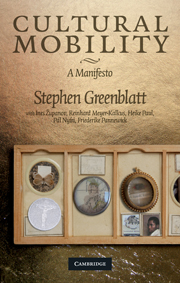Book contents
- Frontmatter
- Contents
- List of authors
- List of illustrations
- Acknowledgments
- 1 Cultural mobility: an introduction
- 2 “The Wheel of Torments”: mobility and redemption in Portuguese colonial India (sixteenth century)
- 3 Theatrical mobility
- 4 World literature beyond Goethe
- 5 Cultural mobility between Boston and Berlin: how Germans have read and reread narratives of American slavery
- 6 Struggling for mobility: migration, tourism, and cultural authority in contemporary China
- 7 Performativity and mobility: Middle Eastern traditions on the move
- 8 A mobility studies manifesto
- Index
7 - Performativity and mobility: Middle Eastern traditions on the move
Published online by Cambridge University Press: 05 June 2012
- Frontmatter
- Contents
- List of authors
- List of illustrations
- Acknowledgments
- 1 Cultural mobility: an introduction
- 2 “The Wheel of Torments”: mobility and redemption in Portuguese colonial India (sixteenth century)
- 3 Theatrical mobility
- 4 World literature beyond Goethe
- 5 Cultural mobility between Boston and Berlin: how Germans have read and reread narratives of American slavery
- 6 Struggling for mobility: migration, tourism, and cultural authority in contemporary China
- 7 Performativity and mobility: Middle Eastern traditions on the move
- 8 A mobility studies manifesto
- Index
Summary
This chapter deals with the manifold trajectories of theatrical traditions within the Middle East and far beyond its geographical boundaries. These traditions are in motion, traveling from one period to another, from one place to another. All of the traditions presented in this paper are characterized by a certain degree of “performativity,” for they are “enacted” traditions, performed and played out in a certain setting. They consist not only as or in a text, but also onstage; they are performed at a public place at a given time for a certain audience. Through this public enactment these texts gain a unique “life of their own,” going beyond the primary textual meaning.
The concept of performativity is based on recent developments in cultural studies since the 1990s, when a modified conception of what constitutes culture emerged. Whereas in textual approaches culture is conceived as “text,” this understanding of culture as “performance” focuses more on the specific event character of cultural settings. Interest no longer gravitates towards deciphering the meaning of single elements within a given culture; rather, acts, occurrences, process of exchange (e.g. between the actors on stage and the audience), transformations, and dynamics are intensely scrutinized. The concept of performativity thus entails a crucial shift: its subject matter is no longer a static work of art that is interpreted but an event and – comparable to cultic acts – the particular experience of this event.
- Type
- Chapter
- Information
- Cultural MobilityA Manifesto, pp. 215 - 249Publisher: Cambridge University PressPrint publication year: 2009



